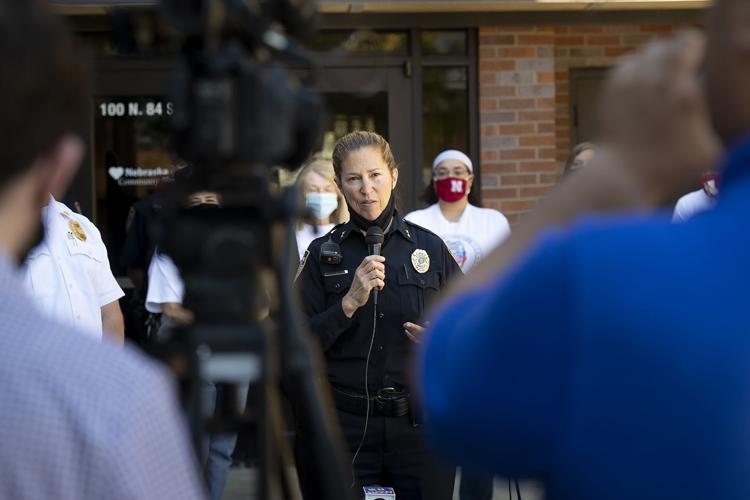Though Lincoln's mayor has repeatedly declined to say whether she asked former Police Chief Teresa Ewins to resign ahead of her surprising departure in July, Leirion Gaylor Baird somewhat abruptly scheduled a meeting with Ewins the day before news of her resignation broke, according to internal city emails.
Gaylor Baird sent a calendar invite to Ewins on the afternoon of July 19, scheduling a meeting for the next day in the mayor's conference room, according to emails the Journal Star obtained through a public records request.
The meeting had initially been scheduled for July 21, but Gaylor Baird moved it up by one day, inviting the police chief and Gaylor Baird's chief of staff, TJ McDowell Jr., to attend.
People are also reading…
Less than 24 hours after the meeting, Ewins resigned without explanation.
McDowell last week declined to detail what was discussed at the July 20 meeting, and he declined to say whether Gaylor Baird asked the police chief to resign.
In an email, McDowell said questions about the gathering, which was described in the mayor's invite as a meeting on public safety, "involve personnel matters that the city does not comment on publicly."
He also said the meeting was regularly scheduled and that it is "not unusual for these types of meetings to be rescheduled to accommodate (the mayor's) busy schedule."
"We have nothing else to add at this time," he said.
Multiple attempts to reach Ewins for comment — which included an unreturned phone call, multiple emails to her sister, who is a California-based employment attorney, and a trip to Ewins' south Lincoln home, which she still owns — were unsuccessful.

Lincoln Police Chief Teresa Ewins (left) and Lincoln Mayor Leirion Gaylor Baird speak at a February news conference to announce the relocation of LPD's Special Victims Unit to a new space at the BraveBe Child Advocacy Center in northeast Lincoln.
The correspondence obtained by the Journal Star includes every email Ewins sent and received between July 15 and July 22, except for those withheld by the city that include attorney-client communications, personnel records and investigative updates.
City officials, including Human Resources Director Barb McIntyre and attorneys working under City Attorney Yohance Christie, have also so far declined to release the financial terms of Ewins' departure. Her annual salary was $187,460 when she resigned.
The records the city did turn over provide little insight into what led to Ewins' departure and little indication that she expected to resign when she did.
The Santa Monica, California, native had scheduled or accepted invitations to at least five meetings that were set to take place the week after she resigned effective immediately July 21, according to the emails.
And Ewins, along with 13 other city leaders, was scheduled to attend an all-day mayoral cabinet retreat July 21, which the mayor canceled the day before, around the same time she met with Ewins, according to the emails.
The day before she met with Gaylor Baird and McDowell, Ewins sent an email to a city HR employee with the subject line "Meeting this afternoon" but received an automatic reply from the city's employee engagement division leader indicating she was out of the office.
It's unclear if the two ever met or why Ewins had sought the meeting. The city did not provide the email that prompted the automatic reply, indicating city attorneys determined its contents weren't subject to disclosure under Nebraska's public records laws.
The former police chief's July 20 meeting with the mayor came three days after a mayoral aide sent a note to Ewins on the messaging platform Teams reducing Ewins' one-on-one meetings with the mayor from monthly to quarterly gatherings, citing Gaylor Baird's "growing calendar commitments."
"Since your meetings are always so productive and since you and TJ (McDowell) have a great working relationship, she felt confident in changing her monthly meetings with you to quarterly," the aide said in a July 17 message. "(The) mayor has asked TJ to continue to meet with you monthly to stay connected."
Three days later, Gaylor Baird, McDowell and Ewins met for what seems to be the last time in her tenure as police chief.
That meeting also came as Ewins' commitment to transparency — which was one of the reasons Gaylor Baird said she hired her — came under increased public scrutiny.
A week before she resigned, Ewins, who was the first woman and first LBGTQ person to lead the Lincoln Police Department, announced she would reduce daily press briefings that had been a staple of the department for more than a century to a three-day-per-week schedule. And two days before she resigned, Ewins denied the Journal Star's public records request for bodycam footage from a crash involving a Lancaster County Sheriff's deputy in May.

Lincoln Police Chief Teresa Ewins speaks to reporters July 14 at the Hall of Justice while Lincoln Fire and Rescue spokeswoman MJ Lierman and Lancaster County Chief Deputy Sheriff Ben Houchin look on in the background.
In an email sent after the paper published a story noting that the end to daily media briefings was a break with more than 100 years of precedent, Ewins questioned that timeline to other department employees.
"What is he talking about?" Ewins wrote in a July 18 email, which included a screenshot of the Journal Star's story, to Erika Thomas, the department's public information officer manager.
"That guy," Ewins wrote. "100 years? Pls look into that for me of when the daily briefing started."
Thomas responded hours later, sharing with Ewins a link to the same blog post the paper had cited . Casady, in his blog, cited a 1909 newspaper clipping that referred to the department's daily media briefing as a “time honored” routine.
Thomas forwarded Ewins a message from then-Assistant Police Chief Michon Morrow, who has since been named the department's acting chief, in which Morrow said a review of LPD history files made clear "we have always enjoyed a working relationship with the local media."

Former Lincoln Police Chief Teresa Ewins speaks at a police briefing July 14. She resigned without explanation just days later.
"We have countless articles from the early 1900s where we clearly shared information with them. What can’t be discerned is how the information was shared," Morrow said, before speculating that "it is more than likely the reporters called or stopped by" rather than attending a daily briefing.
Ewins didn't respond to Thomas' emails, according to the records provided by the city.
In August, Morrow said the changes made under Ewins to the department's media practices "had had an impact that I don’t think was fully measured when that decision was made."
"To that end, I wasn’t a part of those decisions," she said.
However, the department has not reinstituted daily media briefings in the months since Ewins' resignation.

Lincoln Police Chief Teresa Ewins speaks during an interview with the Journal Star in March 2022.
In her 689 days as Lincoln's police chief, Ewins steered the department through a series of controversies, including some of her own creation. LPD's slow shift away from transparency under the former San Francisco Police commander marked only one such dilemma.
The department was embroiled in controversy the day Ewins was sworn in in August 2021, already marred by allegations of sexual misconduct, discrimination and retaliation that first surfaced more than a year before she arrived in Lincoln, when a former police officer became the first of five current and former department employees to file lawsuits against the city.
Though allegations of a toxic culture toward women within the department existed before Ewins was hired, allegations of retaliation against whistleblowers only amplified after her arrival.
Ewins fired four officers who had raised concerns over what they described as systemic harassment, discrimination and retaliation that pervaded LPD. A fifth officer who raised such concerns resigned, citing the hostile work environment her complaints had created.
In interviews, Ewins maintained that the firings were justified.
The city commissioned an independent assessment of the Police Department that in September 2022 revealed half of the agency's female officers surveyed reported they had encountered discrimination or harassment.
In a video message sent to department employees after the city released the 58-page assessment, Ewins asked officers to put that statistic "in perspective" and "not blow it up to a level that dissuades you from understanding the assessment" as a whole.
After the city released the results of an independent assessment of LPD, the police sent a video message to department employees, a copy of which was obtained by the Journal Star through a public records request.
The public report was at least the third draft the independent firm provided to the city, according to internal emails obtained through a separate records request earlier this year. The city declined to release earlier versions of the report, for which it paid $110,000.
The firm, 21CP Solutions, largely recommended only minor policy changes in response to reports of harassment, discrimination and retaliation at the department, where more than 30 current and former department supervisors have been accused of discriminating against female officers or enabling such discrimination in more than 100 pages of lawsuit and EEO complaint filings.
City leaders, including Ewins and Gaylor Baird, struggled in a December 2022 news conference to point to changes that would address the root causes of those issues.
“The policies, the training are all important to try and deter that kind of behavior,” Ewins said then. “At the end of the day, it’s about people being held accountable.”
In the only lawsuit over the Police Department's workplace culture that has been resolved, the city settled out of court with former Officer Sarah Williams, paying her $65,000 in December 2021 — three months into Ewins' tenure.
Still, under Ewins, the department's response to the whistleblowers — and public safety in general — became a focal point of attack ads targeting Gaylor Baird's reelection bid this spring.
Mailers and television ads blanketed the city, touting cherry-picked statistics saying Lincoln’s crime had skyrocketed under Gaylor Baird’s administration, and that her administration had silenced whistleblowers.
The Lincoln Police Union, which supported Ewins' hiring in 2021 over a group of three other finalists, endorsed Gaylor Baird’s challenger, Suzanne Geist, who failed to unseat the mayor.
Though homicides reached double digits in Lincoln last year for the first time since 2016, the city's violent crime rate is substantially lower now than it was the 1990s and early 2000s.
“Chief Ewins demonstrated a commitment to making our community safer and making our city stronger, even though police departments are facing a lot of different challenges every day," City Council Chairman Tom Beckius said upon her resignation.

Lincoln Police Chief Teresa Ewins speaks to the crowd about the LPD's partnership with the Child Advocacy Center on Oct. 25, 2021. The department plans to relocate its Special Victims Unit to co-locate with the center as it expands and remodels.
But the public's safety did not shield Ewins from other tribulations, internally and beyond.
The Police Department was short staffed before Ewins arrived in Lincoln, an issue that Ewins repeatedly tried, but ultimately failed, to remedy in her 23-month tenure in Lincoln. The staffing shortfall left the department increasingly reliant on overtime — a solution that Ewins noted would save the city money in the long run but worried could impact the health and welfare of officers.
The department had approximately 25 vacant officer positions when Ewins took over in August 2021. When she left, the department, which has the budget for 366 sworn officers, employed 339 officers — a figure that included 10 recruits who will not police Lincoln’s streets without supervision until next summer.
Some of the department's community partnerships faced setbacks or ended altogether under Ewins.
In December 2021, a year after to unsuspecting residents in concert with the Malone Center, a plan to renew the program fell through in part due to communication breakdowns between the nonprofit and police.
And after offering a safe place for police to take intoxicated people to sober up for nearly 40 years, The Bridge opted not to renew its contract with LPD and other area law enforcement agencies in 2022, a decision that followed miscommunications between the nonprofit and city and county officials.
Ewins also clashed with the union early on in her tenure at LPD when she tried to re-create the position of lieutenant within the department and unilaterally appoint them to different stations and shifts, rather than allowing would-be lieutenants to submit requests for the location and time they'd prefer to work.
She had hoped to hire lieutenants by the end of 2021. The department ultimately didn't do so .
Ewins also faced muted criticism in her initial months for being inaccessible to rank-and-file officers — a shortcoming the former chief acknowledged in December 2021, when she said she didn't feel like she had done enough to communicate with Lincoln's residents or its police force.
"That's completely on me," she said then.

New Lincoln Police Chief Teresa Ewins speaks at a news conference in September 2021 for a blood drive held in memory of fallen investigator Mario Herrera earlier this month.
But qualms over Ewins' accessibility did not quiet as time marched on.
Tom Duden, a former police officer elected to the City Council in May who was critical of Ewins and city administration during his campaign, said in July that he’d heard comments from staff concerned that she wasn’t making herself available to officers.
“She’s been creating so much resistance with media and attorneys and staff, so I think it’s all a good move,” he said of her departure.
The former police chief's inaccessibility marked a stark contrast from the kind of law enforcement official Ewins promised to be at a candidate forum before she was hired. Then a 26-year veteran of the San Francisco Police Department, Ewins billed herself to Lincoln residents as the city's next communicator-in-chief.
"This is gonna be very normal if I'm here," Ewins said in June 2021 at a town hall-style candidate forum, less than two weeks before Gaylor Baird hired her.
But Ewins followed through on that promise only sparingly, appearing at as few as six town halls across Lincoln in her nearly two-year tenure. The department did not invite the media or residents at large to a series of four town halls that Ewins appeared at this summer, sending invitations through homeowner association mailing lists.
When she did take questions from the public at such events, her answers, at times, trafficked in half-truths and often prompted backlash.
At town hall in Havelock in July 2022, which came less than two months after a Memorial Day weekend crash on O Street killed two people and injured 20 others, Ewins drew an angry response when she suggested she liked the idea of impounding the cars of perilous drivers — a quip that overshadowed the police chief's prepared talking points on traffic enforcement and education.

Lincoln Police Chief Teresa Ewins speaks during a town hall meeting at the Malone Center in January 2022.
In a town hall at the Malone Center in January 2022, people questioned the chief's public comments on the firing of Sgt. Angela Sands after Ewins had answered questions on Sands' firing in a radio interview.
Ewins, in her response, said she "will not" talk publicly about internal matters, but also described responding to lawsuits and media coverage about the department's internal culture as a responsibility.
"For a long time, we've been asked to be transparent, and I didn't give details that really — I did not say names, and I did not give details to the point where it really tells you much about the case," she said.
But Ewins and said her firing had to do with "untruthfulness." The interview — and Ewins' rewriting of it at the town hall — were both mentioned in the lawsuit Sands filed against the city this year.
"I hope we have our day in court, so the public can understand," Ewins had said at the town hall. "Because transparency is exactly what communities are asking for."
Photos: Teresa Ewins tenure as Lincoln police chief

Lincoln Police Chief Teresa Ewins speaks to reporters Friday while Lincoln Fire and Rescue spokeswoman MJ Lierman and Lancaster County Chief Deputy Sheriff Ben Houchin look on in the background.

Mary Schwab (front left) and Barbara Brewer (front right) talk with Lincoln Police Sgt. Jon Sears (second left) and Chief Teresa Ewins during a townhall-style meeting Monday at the Auld Pavilion Recreation Center.

Lincoln Police Chief Teresa Ewins (left) and Lincoln Mayor Leirion Gaylor Baird speak at a February news conference to announce the relocation of LPD's Special Victims Unit to a new space at the BraveBe Child Advocacy Center in northeast Lincoln.

Lincoln Police Chief Teresa Ewins addresses recent graduates of the department's police academy in June.

Lincoln Police Chief Teresa Ewins and Mayor Leirion Gaylor Baird sit for an interview with the Journal Star about changes in the department amidst allegations of sexual harassment and a toxic work environment.

Lincoln Police Chief Teresa Ewins speaks during a town hall meeting at the Malone Center in January 2022.

Lincoln Police Chief Teresa Ewins speaks to the crowd about the LPD's partnership with the Child Advocacy Center on Oct. 25, 2021. The department plans to relocate its Special Victims Unit to co-locate with the center as it expands and remodels.

New Lincoln Police Chief Teresa Ewins speaks at a news conference in September 2021 for a blood drive held in memory of fallen investigator Mario Herrera earlier this month.

Teresa Ewins speaks ahead of her confirmation vote as Lincoln's next police chief on Monday at the City-County Building.





















